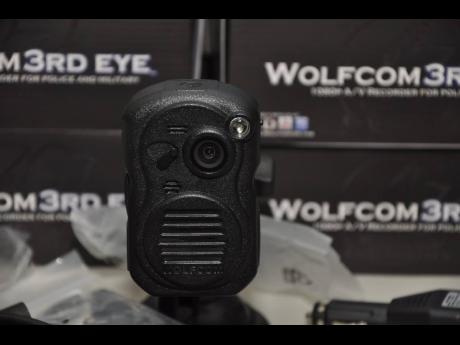JCF urged to revise body cam policy for better enforcement
The Jamaica Constabulary Force (JCF) is being urged to revise its policy for body-worn cameras (BWCs), specifically addressing the consequences for officers who fail to activate their devices.
Jamaicans for Justice (JFJ), a leading human rights group, praised the 2021 policy for “stronger measures” on privacy rights, compared to earlier guidelines. However, JFJ Executive Director Mickel Jackson highlighted a critical gap in the policy concerning compliance and enforcement.
“The SOP (Standing Operating Procedures) mentions that a breach of protocol may subject officers to disciplinary actions. What are those? How is appropriate disciplinary action determined? The question we must also answer: Should we have the provisions governing body-worn cameras elevated to legislation with a more detailed SOP guiding law enforcement, especially given that it ought to govern the JDF (Jamaica Defence Force) officers when deployed in communities working with JCF?” Jackson questioned.
She said that based on data from the Ministry of National Security, up to early 2023, approximately 208 BWCs were operational across six police divisions experiencing states of emergency or zones of special operations (ZOSOs). The army reported that up to 32 members working with the police in ZOSOs were equipped with helmet cameras.
Jackson argued: “This is not positive news, given that many more divisions were under the states of public emergency, and body-worn cameras are especially needed in situations where the police have increased powers and citizens’ rights are curtailed ... . In a high-crime environment where the government is trending towards tough-on-crime legislation and proposing increased powers to the police, body-worn cameras are an important tool ... .”
Public access to BWC footage remains a contentious issue, with various challenges in jurisdictions where the devices are widely used. The JCF policy acknowledges public access, with exceptions to protect privacy rights and ongoing investigations, aligning with practices in the United States and the United Kingdom.
Under the policy, members of the public can request BWC recordings, subject to approval by the police commissioner. However, the specific protocol for handling these requests remains unclear, especially given the JCF’s lack of response to questions from The Sunday Gleaner.
It is also uncertain whether BWC footage will be treated as ‘documents’ under the Access to Information (ATI) Act, which grants public access to official documents held by public authorities.
The ATI law defines a ‘document’ broadly, including electronic data, films, tapes, and visual images.
Privacy of uninvolved persons
The JCF policy stipulates that recordings should only be released to the public in cases where investigations are not compromised and that such releases must consider officer safety, privacy of uninvolved persons, and due process.
Where footage is released, it must be edited to protect the identities of officers, suspects, victims, and bystanders, preserving their dignity, respect, and human rights.
In the United States, the Reporters Committee for Freedom of the Press noted that while most state public records laws, similar to Jamaica’s ATI Act, cover video and audio footage, some states have enacted laws exempting BWC footage from disclosure. In other states, such footage is generally available, subject to exemptions protecting privacy and ongoing investigations.
Gunita Singh, a staff attorney at the non-profit, argued, “Only when the press and public have timely access to police body camera footage can they adequately oversee law enforcement conduct ... . Without public disclosure of the footage, police body camera technology fails to serve its core purpose: building public trust and accountability in law enforcement.”
In California, law enforcement agencies are required to release video to the public no later than 45 days after an incident. The New York Police Department similarly provides video in response to freedom of information requests unless prohibited by law. In the United Kingdom, the Metropolitan Police, the country’s largest force, grants the release of body camera material at the discretion of the commander.
Singh highlighted the challenges journalists face in accessing BWC footage, stating, “In many cases, law enforcement agencies control the release of body camera footage, and many opt to shroud it in secrecy, heavily editing footage or withholding it altogether. In those cases, legal challenges are often the only way for journalists to fight for the disclosure of the recordings.”
She further emphasised the need for a culture of transparency within law enforcement, along with clear, enforceable deadlines for responding to or fulfilling requests for footage.
“Law enforcement conduct is a matter of significant public concern, and it’s crucial for journalists and the public to be able to access body camera footage to shed light on how police interact with the public,” Singh told The Sunday Gleaner.


